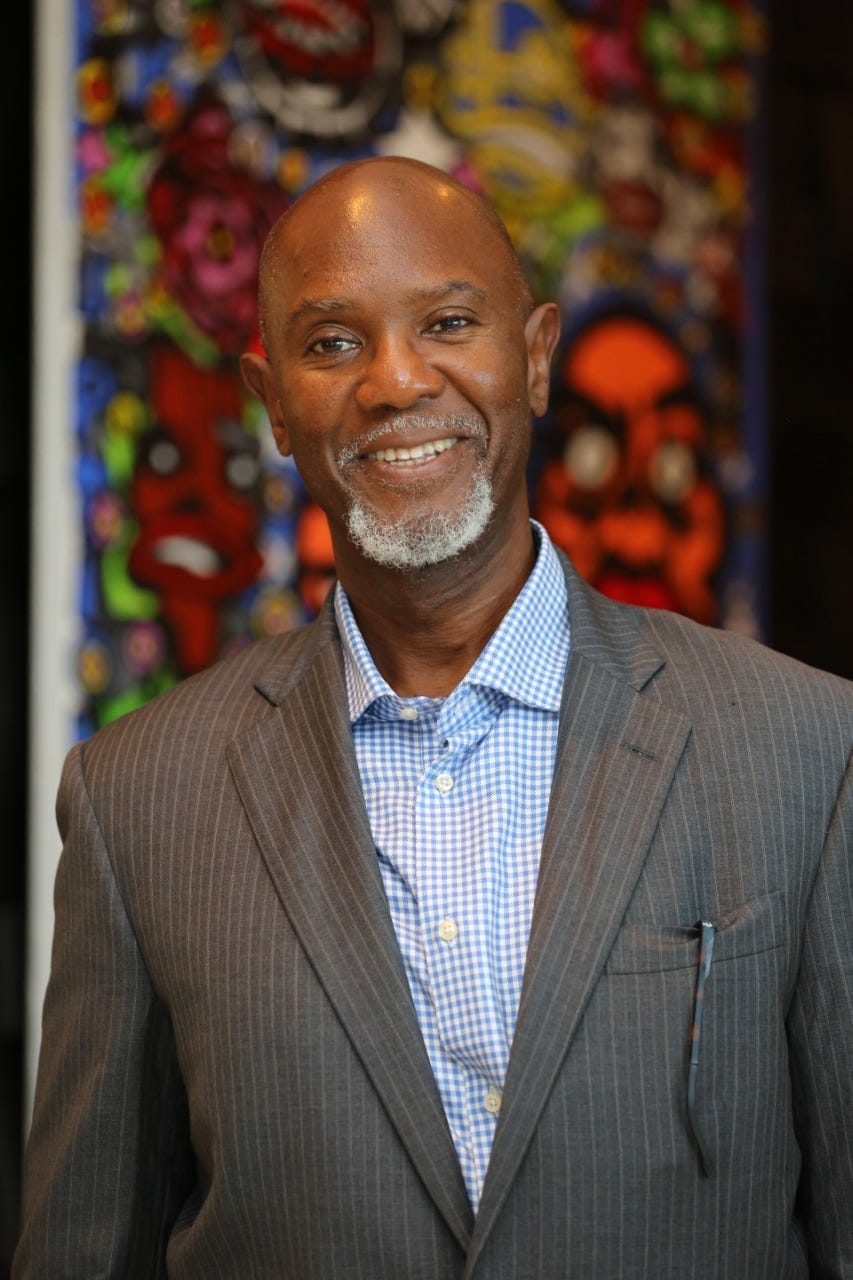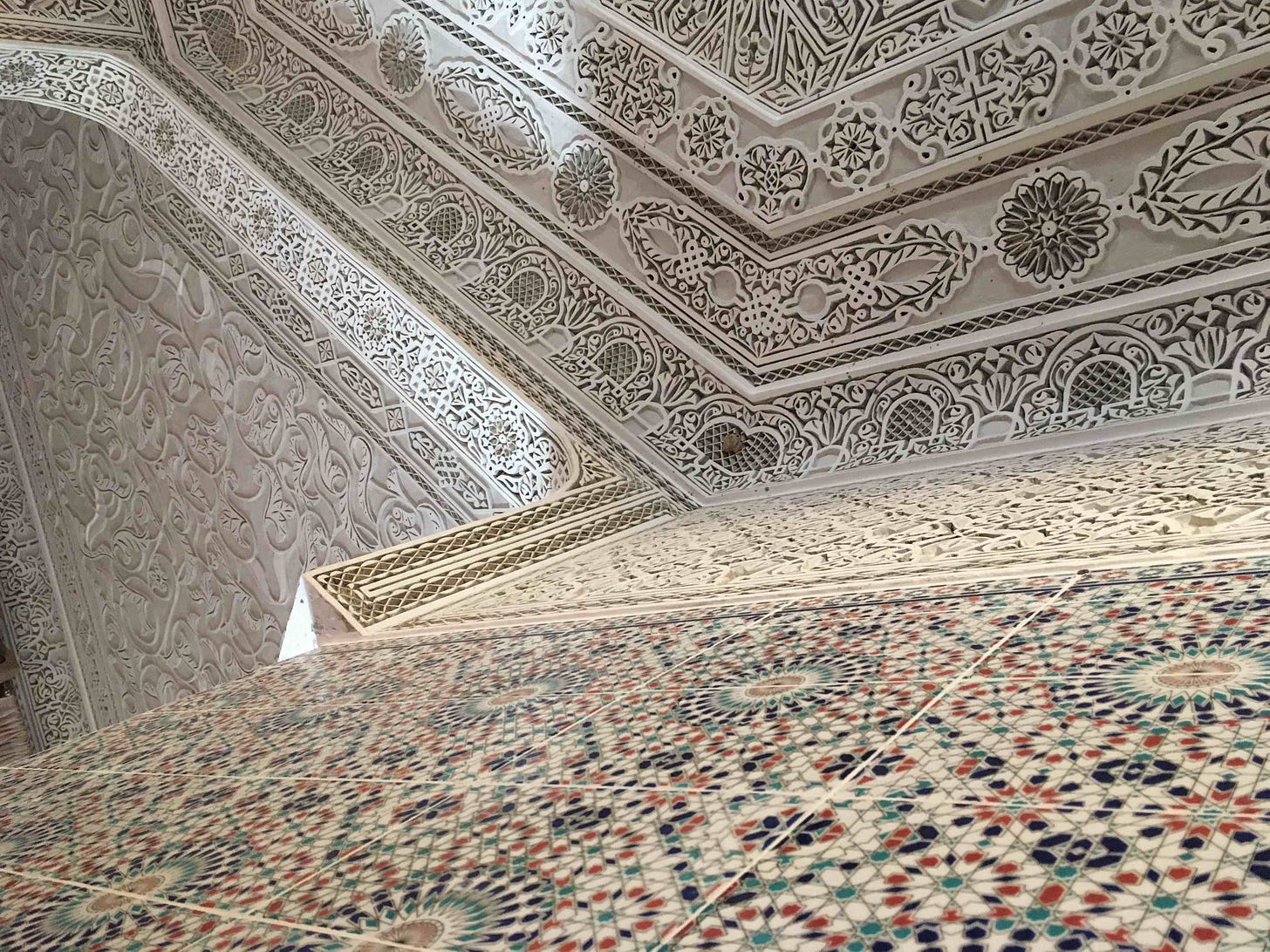Doomed Quest to Recover Lost Home
Exilic writings of K. Barrett Bilali, Cormac McCarthy, and Linh Dinh
I finally met my doppelganger: Kevin Barrett, the American Muslim journalist living in Morocco.* Kevin, a.k.a. K. Barrett Bilali, who lives near Casablanca, traveled to Berkane to cover an Artificial Intelligence conference, which brought him close enough to my house to drop by for dinner last night.
Kevin has been living in Morocco for nine years. He does eclectic journalism and PR work for a living, but the heart and soul of his oeuvre is his Substack, Bilali’s Call, where on selected Thursdays he posts evocatively nostalgic pieces about his youth in upstate New York. (The most recent is “Thursday Nostalgia #32: Christmas Day in the Village.”)
Those essays pay tribute to a lost 1970s-ish America, a nation that could still look in the mirror and like what it saw. It’s a world before Wal-Mart, before woke, before smartphones and social media stupidity. Back then, people actually socialized face-to-face. Kevin’s family, the only African-Americans in Bloomingburg, New York, got along well with their white friends and neighbors. In that era, anger wasn’t mandatory for blacks, nor guilt for whites. But now we have diversity training to solve that problem.
Kevin is a poetic soul stuck in a prosaic and deteriorating world. How he came to Islam and wound up in Morocco is probably too long a story to tell here, even if I knew it.
Is Moroccan exile a happy ending? Not entirely. There’s always going to be ineffaceable sadness over what’s been irretrievably lost. And it isn’t just America. Over a chicken-and-olives tajine with home-pickled lemons from our tree, Kevin and I agreed that while the US is in steep civilizational decline, Morocco isn’t entirely immune to the same forces. Admiring our arabesque engraved-tile walls and hand-worked carved-plaster ceiling, Kevin said that kind of craftsmanship wasn’t unheard of twenty years ago, when our home was built, but today it’s almost extinct. The new houses are as ugly as offices, and just finding competent handymen to do simple maintenance tasks is becoming a challenge. Are Moroccans, like Americans, getting stupider, as in Idiocracy? Are they all hashishis? Is it the jab? Or COVID? Maybe both?
Cormac McCarthy’s “Journey to Mexico”
Being an expat in Morocco sharpens Kevin’s sense of loss as he conjures up images of his vanished American home. Cormac McCarthy followed a somewhat similar trajectory when he won a Macarthur genius grant, used the proceeds to move from Tennessee to El Paso, and started cranking out the books that would make him rich and famous.
McCarthy’s vision of his American home is considerably darker than Kevin Barrett Bilali’s. Its roots are blood-drenched, as exposed in Blood Meridian, McCarthy’s first El Paso novel. But in The Crossing, which I just finished, the poignant lyricism of loss reaches a fever pitch.
The Crossing turns on the teenage protagonist’s fateful decision to try to take a trapped wolf back to its home in the mountains of Mexico. But that wolf, like all of us, can’t go home again. Its native habitat, like K. Barrett Bilali’s 1970s Bloomingburg, no longer exists.** And soon, too soon, the protagonist’s won’t either.
When McCarthy moved to El Paso, he began to imagine a mythical Mexico as a point of alterity from which to contemplate his American homeland. That discovery unleashed a torrent of visionary creativity, beginning with the horrific masterpiece Blood Meridian and continuing with the Border Trilogy that made him a household name, at least among people who still read novels. All four books feature Joseph Campbell style heroes’ journeys from America to Mexico and back. But unlike Campbell’s sources, in which the hero returns from his adventure with a boon to save his homeland, McCarthy’s heroes’ only boon is bitter disillusionment.
Linh Dinh’s Exile
Another of my favorite exilic writers is Linh Dinh. Unlike Kevin Barrett Bilali and Cormac McCarthy, who seem to have been reasonably well-treated by America, Linh was abused by its literary establishment because he refused to kowtow to Judeocracy, the official story of 9/11, and other sacred cows.
Like Cormac McCarthy’s before the Macarthur grant, Linh’s earlier years involved lots of scrambling, odd jobs, and small-time grants and awards. Just when his career seemed to be picking up steam, the whole official literary world simultaneously decided that writers with heterodox views were no longer welcome. Suddenly Linh went from up-and-coming Asian-American writer to “white-nationalist-sympathizing antisemitic conspiracy theorist.” They stopped inviting him to universities. Literary magazines lost interest in his submissions. Today, you can find things online like:
“Linh doesn't plan to publish any further in the United States, it seems to me. He has since become an intellectual anti-Semite and vulgar Jew-hater.” -Viet Nam Literature Project.(OMG! A vulgar Jew-hater! That’s not nearly as classy as being a tasteful, restrained, decorous, genteel, and refined Jew-hater…like, say, Ezra Pound.)
“The poet Linh Dinh is running his mouth about the Jews like a crazy person.” -Mark Ashwill, Counterpunch. (That’s true, you’d have to be crazy to run your mouth about the Jews, because if you do, you’ll never work in this town again. Which definitely proves that there’s no such thing as Jewish power, or Jewish oligarchs funding universities and publishers and literary magazines and festivals for anything other than purely altruistic reasons.)
“In 2021, it came to our attention that the featured writer, Linh Dinh, has expressed anti-Black, anit-Semitic (sic), and overall harmful views.” -Diasporic Vietnamese Artists Network. (Anit-Semitic? Maybe you meant anal-Semitic?)
The American home that Linh looks back at from his globetrotting exile is almost as hideous as McCarthy’s vision in Blood Meridian:
The media’s promotion of vulgar morons feeds the masses’ dream of stardom. I can rap as badly as Megan Thee Stallion or Tyga! I’m even uglier than Sexxy Red!
In Tennessee, a melee involving adults and kids erupted at a kindergarten graduation. With high school diplomas becoming worthless, preschoolers are also awarded congratulatory pieces of paper. In Tucson, a veteran biology teacher resigned because his students couldn’t stop staring at their phones, and he had no power to confiscate them. In Los Angeles, a man slung a hammock on a city bus despite the driver’s objection.
Also in LA, a pregnant restaurant worker couldn’t prepare an order fast enough, so the enraged patron pummeled the cashier. “I felt like he just wanted to kill me,” the bruised victim said. In Houston, a lawyer trying to calm someone angry over his order was shot and killed by this man.
Also in Houston, an elementary school teacher decided to make a porn video in class…
No country for old men indeed.
Long ago, when Linh lived in the slums of Philadelphia, and periodically roamed the land in search of the noisesomest dive bars and grungiest denizens, he enjoyed a sort of love-hate relationship with America. Like John Waters lovingly filming Divine nibbling poodle droppings, Linh fixed his gaze on the tawdry and macabre, the oderiferous pustules on the butt of Lady Liberty, and somehow found them…well, not beautiful, but sort of… inspiring. Linh’s lovable losers may have been ugly as sin, and didn’t smell too good either, but you had to feel for them as they antiheroically endured their misery.
Now all Linh knows about America is what he reads in the papers. “And now people just get uglier, and I have no sense of time,” as some Welsh-sounding crypto-Jew once croaked.
Linh is still writing wonderful descriptions of people in places like Albania, Egypt, South Africa, Vietnam, Cambodia, Thailand, Singapore, Australia…anywhere but America. Read about it at his Substack.
My Moroccan Exile
People sometimes ask whether I have second thoughts about moving to Morocco. Not really. Actually, I never even had any first thoughts.
I barely toyed with the idea in 2000, then again in 2008. But last year, when my wife bought two tickets without telling me, it was the furthest thing from my mind. Still, I went along to humor her.
The real estate guys led us around Saidia showing us unappealing places. My wife pretended to find them mildly interesting. I didn’t bother to pretend. Finally we gave up, dismissed the realtor, and took a walk to the beach. As we approached the park across from the beach, my wife eyed a villa and half-jokingly, half-longingly asked: “Why can’t I have a nice villa like that?” She turned to a man getting out of his car and asked, “is that house for sale?” The man hesitated. He evidently had to think it over. Then he invited us in for tea. The arabesque tiles and ceiling entranced us. Soon the whole house did. Ultimately, I couldn’t deny that it was maktoub. Before I knew what had hit me, I found myself moving to Morocco without having intended to.
We put together a plan to sponsor educational tourism and maybe a cultural center. That project is developing more slowly than expected since, as it turns out, American religious nonprofits like ours face uphill battles for permission to operate in Morocco. Everything religious in Morocco is controlled by the Ministry of Religious Endowments, and the Moroccan government is skeptical of American NGOs for good reason, since they often represent evangelical proselytizers, Soros-funded LGBTQ advocates, or other such annoyances. So we will need to create a Moroccan nonprofit with a non-religious, noncontroversial mission statement to sponsor our cultural center.
Everything here is taking longer than expected: the nonprofit, the residency card, work on the house. We’ve been here almost a year and most of my books still aren’t unpacked, because the room where they’ll go, which was supposed to be finished in September, still isn’t. My Arabic, which was OK but not exactly near-native 25 years ago, is a lot better than last year, but still far from near-native. In short, everything here seems stuck in a permanent state of insha’allah.
Meanwhile the American home I once had seems like a dream from ages past. Overlooking an oxbow lake off the Wisconsin River, with two acres of pine forest and a half acre of raised bed gardens under scattered oak, ash, beech, and mulberry trees, it had been in the family since 1950, waiting for the log house that I helped a Mennonite family business build in 2003. Using permaculture techniques including humanure composting, I turned the sand to rich sandy loam, built outbuildings including an earth-sheltered greenhouse, grew tons of food, cut my own firewood, buried my dog in the sand pit, and hoped to be buried there one day myself if the county would allow it.
At least we found new owners who seem to appreciate it.

Now, instead of wading through sand bars and channels in the Wisconsin River, I often find myself in the saltier sand bars and rip current channels of one of the Mediterranean’s best beaches. And instead of growing vast quantities of lettuce, greens, cucumbers, tomatoes, chives, onions, squash, and whatnot, I’ve got downsized courtyard gardens with parsley, mint, rosemary, thyme, gherkins, a few tomatoes, wormwood, and a lemon tree in front and night jasmine and bougainvillea out back. If you come visit, we can sit in the courtyard and sip Moroccan mint tea—or sheba(wormwood) if you’re feeling decadent or adventurous.
In 2006, when I was the focus of a media campaign pushing back against the 9/11 truth movement, a Wisconsin Public Radio interviewer asked me: “If you think the US government was involved in 9/11, why are you still living here?” My answer was something like “I’ll be damned if I let these treasonous criminals run me out of my own country.”
A few months after I moved to Morocco, the Gaza genocide started. An otherwise promising presidential candidate, RFK Jr., enthusiastically supports the genocide—and what makes it even more shameful is that he must know the Zionists killed his father and uncle.*** And now Uncle Scam is playing nuclear Russian roulette with Putin on an almost-daily basis.
Today, looking back across the Atlantic, it occurs to me that the saddest thing isn’t that I’ve lost my ancestral lands in Lone Rock, but that the whole USA is collapsing into utter perdition. There’s really nothing left there for a person of decency and honor, if there ever was.
*Kevin had to change his pen name to K. Barrett Bilali to avoid being mistaken for a notorious conspiracy theorist.
**OK, I know Bloomingburg still exists, but everybody “there” is staring at a cell phone and shopping at Wal-Mart.
***Ron Unz underlines the shamefulness of the Kennedy assassinations and America’s acquiescence in his new article.





No comments:
Post a Comment